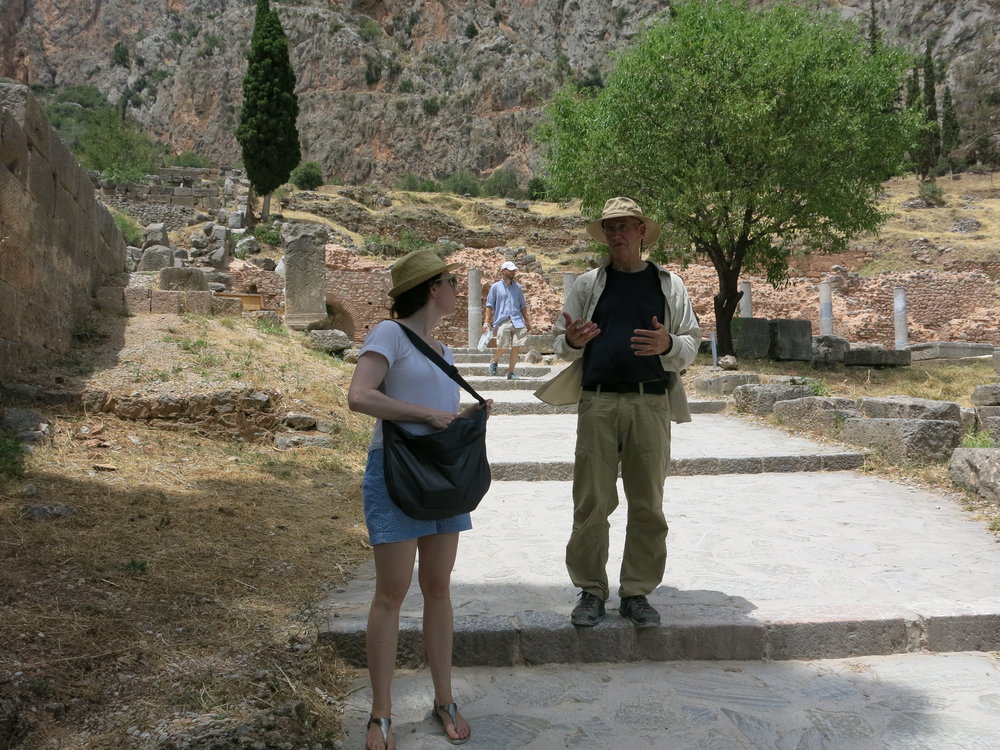In the Echo of Delphi
November 16, 2016
Christopher Huck, Cohort ’15
Navigating our way along the twisting mountain road leading out of Athens, I turned to notice the morning’s haze slowly erasing the sprawling city left behind. We were headed to what was once believed to be the very navel of the earth, the sacred ‘Omphalos,’ the ancient site of Delphi on the steep slopes of Mt. Parnassus. As I climbed up to the ruin of the temple of Apollo, I was struck by the unexpected sense of bathos that pervaded the place.
.jpeg)
Pythia and her magnificent temple were long gone. I was abandoned to my own echo falling between the columns. And from within this echo, I thought, improbably, of Friedrich Nietzsche. He who celebrated the tension between Bacchanalian excess and Apollonian sobriety. This place spoke to the Nietzsche of my mind: lover of Dionysus; foe of the demos; ardent admirer of Attic tragedy…
I heard Pythia, her oracular voice rising from the haze, as she asked: “Nietzsche, why have you come?”
“Ah, Pythia” he responds in his fluent Greek, “Here you are sitting in your sacred temple of Apollo, sadly unawares that the whole world is caught in a fierce dialectic between your own staid Apollonian and that vibrant Dionysian. Your Apollo produces mere empty appearances, illusions. Schein. Even that old man Socrates misses the point. Has he been here recently? No, of course not. He completely misconstrues the brilliance of Attic tragedy and the will of the gods. He actually thinks that no harm will befall the good man, that no one does wrong willingly. Ha! Clearly it’s tragedy that confronts us with the deep truths of life. That ever-optimistic Socrates could never understand this. He cast his lot with ‘knowledge’ as the true guide. It took a full cup of hemlock for Socrates to even believe in the human need for music!”
“Nietzsche!” Pythia interrupted, “People come to me seeking the counsel of the gods. What do you seek?”
“Nothing”, replied Nietzsche, “I seek nothing from your gods. Our cherished individuality is nothing but an illusory appearance. That truth of self which Oedipus so persistently pursued? It became intolerable to him when he attained it. That is the universal human fate, and they can’t bear that naked truth. It must be tempered by the Dionysian. Hence, tragedy; the pinnacle of culture revealing ourselves to ourselves. It is the Apollonian/Dionysian dialectic, manifest in divine Dionysian music, overwhelming those Apollonian delusions, and revealing the blood of life to us. It is our only defense against the despair and pessimism which is the lot of all of us! You’ll see. Yours will become known through time as a most tragic of cultures!”
“As will yours, dear Nietzsche,” murmured Pythia cryptically, “As will yours.”
And then the scene vanished as quickly as it had appeared. Standing on this rocky, improbable site, high above the Corinthian Gulf, I found that ancient Greece raises far more questions than it answers.

